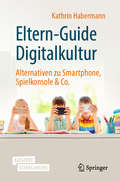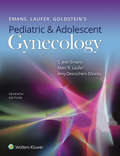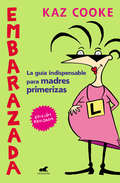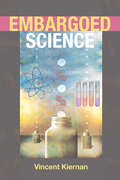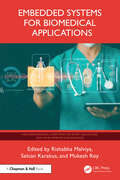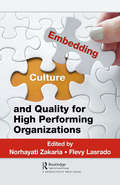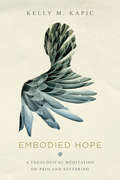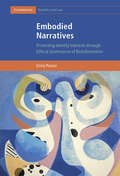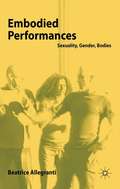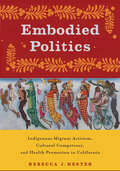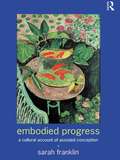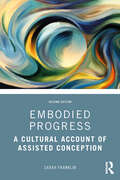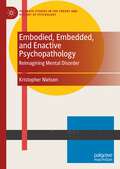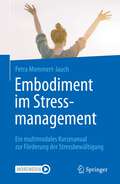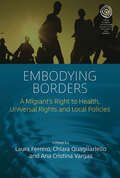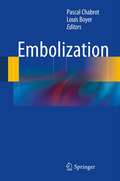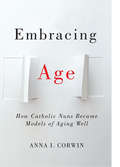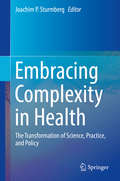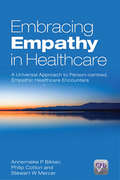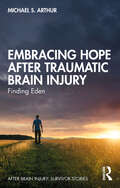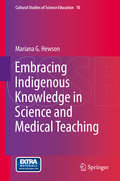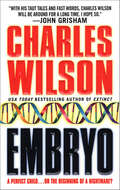- Table View
- List View
Eltern-Guide Digitalkultur: Alternativen zu Smartphone, Spielkonsole & Co.
by Kathrin HabermannDieser Ratgeber hilft Eltern, mit der allgegenwärtigen Präsenz von Smartphone, Tablet und Co. gelassen und kreativ umzugehen. Erfahren Sie, weshalb Smartphones gerade Ihre Kinder magisch anziehen, wie wichtig Langeweile für die Entwicklung Ihres Kindes ist und welche Auswirkungen der Medienkonsum auf die Gehirnentwicklung hat. Dieses Buch zeigt Ihnen zahlreiche spannende und gleichzeitig entwicklungsfördernde Alternativen zum Medienkonsum, die Sie täglich anbieten können. Praxistipps für herausfordernde Situationen wie der Restaurantbesuch, lange Autofahrten oder die fünfstündige Bahnfahrt: Mit dieser Lektüre sind Sie optimal gerüstet.Plus:• Wissenschaftliche Hintergründe und aktuelle Studien übersichtlich und verständlich aufbereitet• Fragebögen und Checklisten zur Ermittlung des Medienkonsums• Material- und Spiellisten, Mediennutzungsvertrag u.v.m. zum Download und als Kopiervorlage
Eltern-Guide Social Media: Instagram, Snapchat, TikTok und Co. – Kinder und Jugendliche unterwegs im Internet
by Kathrin HabermannDieser Ratgeber verschafft Eltern einen Einblick in die Welt von TikTok, Instagram, Facebook, Twitter und Co. und erklärt, welche Chancen und Gefahren das Internet für ihren Nachwuchs birgt. Welche Plattformen sind auf dem Markt und wie funktionieren sie? Worauf sollte ich achten, wenn mein Kind beginnt, in Onlineshops zu bestellen? Wie sieht die gelungene Anleitung zum Umgang mit modernen Medien im Idealfall aus? Erfahren Sie, was Kinder und Jugendliche selbst über den Medienkonsum denken und wie viel Medienkompetenz heute wirklich notwendig ist, um gesellschaftlich und beruflich nicht abgehängt zu werden.Aus dem Inhalt:• Auswirkungen digitaler Medien auf Gehirnentwicklung, Konzentration und Suchtverhalten• Einsatz digitaler Medien in Schulen• Chancen und Risiken von Social Media und Gaming, Onlinehandel und Datenschutz• Richtlinien zur gesunden Screentime und Anlaufstellen für ElternKlären Sie sich und Ihren Nachwuchs auf und verhelfen Sie ihren Kindern zu verantwortungsvollem Handeln im Internet.
Emans, Laufer, Goldstein's Pediatric and Adolescent Gynecology
by S. Jean Emans Marc R. LauferOffering multidisciplinary guidance to all health care practitioners who provide clinical care for children and adolescents, the 7th Edition of Emans, Laufer, Goldstein’s Pediatric & Adolescent Gynecology has been extensively revised to keep you up to date in this complex field. You’ll find comprehensive coverage of the full spectrum of medical and surgical approaches to common and uncommon problems – everything from infants with vulvar rashes, to the child with early or late onset of puberty, to adolescents and young adults with ovarian cysts or STDs. More than 40 experts in the field, led by editors from Boston Children’s Hospital and Harvard Medical School, have contributed to ensure this classic text remains relevant and useful in daily practice.
Embarazada: La guía indispensable para madres primerizas
by Kaz CookeEmbarazada, un libro entretenido y divertido sobre todo lo que necesitas saber del embarazo. De la mano de Kaz Cooke conocerás todos los secretos del embarazo el nacimiento y el cuidado del bebé. En este libro no hallarás órdenes militares, sino muchos dibujos y los consejos más sabios, ingeniosos y mejor fundados que puedes conseguir. Todo lo que necesitas saber sobre la parte espeluznante, la parte divertida y las partes pudendas.
Embargoed Science
by Vincent KiernanThe popular notion of a lone scientist privately toiling long hours in a laboratory, striking upon a great discovery, and announcing it to the world is a romanticized fiction. Vincent Kiernan's Embargoed Science reveals the true process behind science news: an elite few scholarly journals control press coverage through a mechanism known as an embargo. The journals distribute advance copies of their articles to hundreds and sometimes thousands of journalists around the world, on the condition that journalists agree not to report their stories until a common time, several days later. When the embargo lifts, airwaves and newspaper pages are flooded with stories based on the journal's latest issue. In addition to divulging the realities behind this collusive practice, Kiernan offers an unprecedented exploration of the embargo's impact on public and academic knowledge of science and medical issues. He surveys twenty five daily U.S. newspapers and relates his in-depth interviews with reporters to examine the inner workings of the embargo and how it structures our understanding of news about science. Kiernan ultimately argues that this system fosters "pack journalism" and creates an unhealthy shield against journalistic competition. The result is the uncritical reporting of science and medical news according to the dictates of a few key sources.
Embedded Systems for Biomedical Applications (High-Performance Computing for Smart Healthcare)
by Rishabha Malviya Selcan Karakuş Mukesh RoyThis book is an essential guide to the constantly changing environment of embedded systems in healthcare in a world where the convergence of technology and healthcare is becoming increasingly important. It further explains different scenarios corresponding to the latest technologies in the healthcare system for early diagnosis, enhanced treatment, and cure of diseases, including remote patient monitoring, cardiac monitoring, and deep learning for remediation.Features:• Emphasizes how embedded systems contribute to clinical care by facilitating personalized treatment and informed decision-making for healthcare professionals.• Highlights the role of embedded systems in tracking treatment progress, enabling healthcare professionals to monitor patient responses and adjust treatment plans accordingly.• Explores the application of embedded systems in remote patient monitoring, allowing for continuous health monitoring outside traditional healthcare settings.• Presents the integration of deep learning and telecommunication technology with embedded systems, optimizing their efficiency and utilization in biomedical applications.• Offers insights into future prospects for advancing biomedical applications through embedded systems, providing a roadmap for further innovation and development in the field.This reference work is useful for scholars and professionals interested in the applications and optimization of emerging smart technologies in the field of healthcare.
Embedding Culture and Quality for High Performing Organizations
by Norhayati Zakaria Flevy LasradoEmbedding Culture and Quality for High Performing Organizations (978-1-138-48338-5, K349105) Shelving Guide: The aim of this book is to bridge two different core disciplines: quality management and cross-cultural management, based on how multinational corporations work, and how culture determines individual practices and values. Understanding these previously separate fields is essential to keeping multinational cultures innovative and sustainable. The authors’ research blends corporate and cultural perspectives to promote quality management practices that build organizational excellence. Whereas most books currently on the market are based on corporate culture and quality management, this book uniquely considers cross-cultural impacts on organizational effectiveness and global human resource management. This book provides opportunities for business practitioners and researchers to learn practices that are effective in building sustainable organizational excellence. It offers a practice guide to building a quality management program that emphasizes culturally-diverse work environments, cross-cultural management, and organizational excellence.
Embodied Hope: A Theological Meditation on Pain and Suffering
by Kelly M. Kapic"This book will make no attempt to defend God. . . . If you are looking for a book that boasts triumphantly of conquest over a great enemy, or gives a detached philosophical analysis that neatly solves an absorbing problem, this isn't it."Embodied Hope
Embodied Narratives: Protecting Identity Interests through Ethical Governance of Bioinformation (Cambridge Bioethics and Law)
by Emily PostanIncreasing quantities of information about our health, bodies, and biological relationships are being generated by health technologies, research, and surveillance. This escalation presents challenges to us all when it comes to deciding how to manage this information and what should be disclosed to the very people it describes. This book establishes the ethical imperative to take seriously the potential impacts on our identities of encountering bioinformation about ourselves. Emily Postan argues that identity interests in accessing personal bioinformation are currently under-protected in law and often linked to problematic bio-essentialist assumptions. Drawing on a picture of identity constructed through embodied self-narratives, and examples of people's encounters with diverse kinds of information, Postan addresses these gaps. This book provides a robust account of the source, scope, and ethical significance of our identity-related interests in accessing – and not accessing – bioinformation about ourselves, and the need for disclosure practices to respond appropriately. This title is also available as Open Access on Cambridge Core.
Embodied Performances
by Beatrice AllegrantiDrawing from the author's unique interdisciplinary experience Embodied Performances, now available in paperback, responds to the feminist call for advances in conversations across disciplines. Through a pioneering integration of performance, psychotherapy and feminist philosophy it offers an understanding and critique of embodiment and proposes expansive ways of deconstructing (undoing) and re-constituting (re-doing) sexuality and gender and thus more embodied and ethical ways of 'doing' life. Embodied Performances presents innovative ways of 'knowing' and 're-visioning' which evolves the contemporary zeitgeist by: allying digital media with established forms and considering the socially constructed and biological body at the forefront of theory and practice in both the arts and humanities. In addition, it provides practice-based evidence in the form of thirty-six short online film episodes and stills, forming an integral part of the unfolding discussion in each chapter.
Embodied Politics: Indigenous Migrant Activism, Cultural Competency, and Health Promotion in California (Critical Issues in Health and Medicine)
by Rebecca J. HesterEmbodied Politics illuminates the influential force of public health promotion in indigenous migrant communities by examining the Indigenous Health Project (IHP), a culturally and linguistically competent initiative that uses health workshops, health messages, and social programs to mitigate the structural vulnerability of Oaxacan migrants in California. Embodied Politics reconstructs how this initiative came to exist and describes how it operates. At the same time, it points out the conflicts, resistances, and counter-acts that emerge through the IHP’s attempts to guide the health behaviors and practices of Triqui and Mixteco migrants. Arguing for a structurally competent approach to migrant health, Embodied Politics shows how efforts to promote indigenous health may actually reinforce the same social and political economic forces, namely structural racism and neoliberalism, that are undermining the health of indigenous Oaxacans in Mexico and the United States.
Embodied Progress: A Cultural Account of Assisted Conception
by Sarah FranklinNew reproductive technologies, such as in vitrio fertilization, have been the subject of intense public discussion and debate worldwide. In addition to difficult ethical, moral, personal and political questions, new technologies of assisted conception also raise novel socio-cultural dilemmas. How are parenthood, kinship and procreation being redefined in the context of new reproductive technologies? Has reproductive choice become part of consumer culture? Embodied Progress offers a unique perspective on these and other cultural dimensions of assisted conception techniques. Based on ethnographic research in Britain, this study foregrounds the experiences of women and couples who undergo IVF, whilst also asking how such experiences may be variously understood.
Embodied Progress: A Cultural Account of Assisted Conception
by Sarah FranklinThis new edition of Sarah Franklin’s classic monograph on the development of in vitro fertilisation (IVF) includes two entirely new chapters reflecting on the relevance of the book’s findings in the context of the past two decades and providing a ‘state-of-the-art’ review of the field today. Over the past 25 years, both the assisted conception industry and the academic field of reproductive studies have grown enormously. IVF, in particular, is belatedly becoming recognised as one of the most influential technologies of the twentieth and twenty-first centuries, with a far-reaching set of implications that have to date been underestimated, understudied and under-reported. This pioneering text was the first to explore the emergence of commercial IVF in the United Kingdom, where the technique was originally developed. During the 1980s, the British Parliament devised a unique system of comprehensive national regulation of assisted reproduction amidst fractious public and media debate over IVF and embryo research. Franklin chronicles these developments and explores their significance in relation to classic anthropological debates about the meanings of kinship, gender and the 'biological facts' of parenthood. Drawing on extensive personal interviews with women and couples undergoing IVF, as well as ethnographic fieldword in early IVF clinics, the book explores the unique demands of the IVF technique. In richly detailed chapters, it documents the ‘topsy-turvy’ world of IVF, and how the experience of undergoing IVF changes its users in ways they had not anticipated. Franklin argues that such experiences reveal a crucial feature of translational biomedical procedures more widely – namely, that these are ‘hope technologies’ that paradoxically generate new uncertainties and risks in the very space of their supposed resolution. The final chapter closely engages with the ‘hope technology’ concept, as well as the idea of ‘having to try’ and uses these frames to link contemporary reproductive studies to core sociological and anthropological arguments about economy, society and technology. In the context of rapid fertility decline and huge growth in the fertility industry, this volume is even more relevant today than when it was first published at the dawn of what Franklin calls the era of 'iFertility'. Embodied Progress is an essential read for all social science academics and students with an interested in the burgeoning new field of reproductive studies. It is also a valuable resource for practitioners working in the fields of reproductive health, biomedicine and policy.
Embodied, Embedded, and Enactive Psychopathology: Reimagining Mental Disorder (Palgrave Studies in the Theory and History of Psychology)
by Kristopher NielsenEmbodied, Embedded, and Enactive Psychopathology presents a new way of thinking about mental disorder that is holistic yet critically minded, biologically plausible yet value-inclusive, and scientific yet deeply compassionate. Grounded in an embodied, embedded, and enactive (3e) view of human functioning, this book presents a novel conceptual framework for the study and treatment of mental disorders and explores implications for the tasks of classification, explanation, and treatment. Chapters one to three argue for the central role of conceptualization in the study and treatment of mental disorders. Popular conceptual models are critiqued, including other recent enactive frameworks. Chapters four to seven then present 3e Psychopathology and explore its implications. This includes analysis of both research-based efforts to explain mental disorders, and methods for formulating individual-level explanations in clinical practice. New answers are presented for important questions such as: are mental disorders things we do or get? Are mental disorders defined in nature or are they socially constructed? Are mental disorders the same things across different cultures? And, are mental disorders located in our brains, bodies, or environments? This engaging work offers fresh insights that will appeal to clinicians, researchers, and those with an interest in the philosophy of psychiatry.
Embodiment im Stressmanagement: Ein multimodales Kursmanual zur Förderung der Stressbewältigung
by Petra Mommert-JauchDer Körper reagiert auf psychische Belastungen und die Psyche reagiert auf den Körper. Genau diese Wechselwirkung zwischen Körper und Psyche wird durch den Begriff Embodiment umschrieben. Was kann der Körper selbst organisieren, um positiv auf die psychische Verfassung zu wirken und welche Bedingungen können ihn darin unterstützen? Diese Fragen werden im Theorieteil des Buches mit der Darstellung von vier Strategien beantwortet. Im Praxisteil wird für die konkrete praktische Umsetzung ein 8-stündiges multimodales Stressmanagement-Konzept vorgestellt, welches als anerkannte Präventivmaßnahme (§20 Abs.2 SGB V) von der Zentralen Prüfstelle für Prävention 2020 zertifiziert wurde. Das Credo des Konzepts lautet: durch ein breitgefächertes Angebot an neuen körperlichen und sozialen Erfahrungen kann das individuell gestaltete Körper-Seele-Konstrukt neue Wege finden, um wieder in Kontakt zueinander und mit der Umwelt zu kommen.Das Buch richtet sich an alle, die im Bereich des Stressmanagements arbeiten, wie klinische Psychologen, Sportmediziner, Physiotherapeuten, Psychotherapeuten, Sportwissenschaftler sowie an dem Thema Interessierten.
Embodying Borders: A Migrant’s Right to Health, Universal Rights and Local Policies (EASA Series #41)
by Laura Ferrero, Chiara Quagliariello Ana Cristina VargasBased on extensive field research, the essays in this volume illuminate the experiences of migrants from their own point of view, providing a critical understanding of the complex social reality in which each experience is grounded. Access to medical care for migrants is a fundamental right which is often ignored. The book provides a critical understanding of the social reality in which social inequalities are grounded and offers the opportunity to show that right to health does not correspond uniquely with access to healthcare.
Embodying Borders: A Migrant’s Right to Health, Universal Rights and Local Policies (EASA Series #41)
by Laura Ferrero, Chiara Quagliariello Ana Cristina VargasBased on extensive field research, the essays in this volume illuminate the experiences of migrants from their own point of view, providing a critical understanding of the complex social reality in which each experience is grounded. Access to medical care for migrants is a fundamental right which is often ignored. The book provides a critical understanding of the social reality in which social inequalities are grounded and offers the opportunity to show that right to health does not correspond uniquely with access to healthcare.
Embolization
by Louis Boyer Pascal ChabrotThe current textbooks for specialists are too detailed. This book will be a handy pocket guide for trainee vascular radiologists, and will serve as an aide-memoire for senior vascular radiologists. Each procedure will be shown in its entirety. Rather than being a library purchase, this book will be a handy and accessible guide for quick reference aimed at clinical interventional radiologists in multidisciplinary staff rooms and angiography suites.
Embracing Age: How Catholic Nuns Became Models of Aging Well (Global Perspectives on Aging)
by Anna I CorwinEmbracing Age: How Catholic Nuns Became Models of Aging Well examines a community of individuals whose aging trajectories contrast mainstream American experiences. In mainstream American society, aging is presented as a “problem,” a state to be avoided as long as possible, a state that threatens one’s ability to maintain independence, autonomy, control over one’s surroundings. Aging “well” (or avoiding aging) has become a twenty-first century American preoccupation. Embracing Age provides a window into the everyday lives of American Catholic nuns who experience longevity and remarkable health and well-being at the end of life. Catholic nuns aren’t only healthier in older age, they are healthier because they practice a culture of acceptance and grace around aging. Embracing Age demonstrates how aging in the convent becomes understood by the nuns to be a natural part of the life course, not one to be feared or avoided. Anna I. Corwin shows readers how Catholic nuns create a cultural community that provides a model for how to grow old, decline, and die that is both embedded in American culture and quite distinct from other American models. Open access edition funded by the National Endowment for the Humanities. The text of this book is licensed under a Creative Commons Attribution NonCommercial-NoDerivatives 4.0 International License: https://creativecommons.org/licenses/by-nc-nd/4.0/
Embracing Complexity in Health: The Transformation of Science, Practice, and Policy
by Joachim P. SturmbergThis detailed volume illustrates the transformative nature of systems and complexity sciences for practice, research, education, and health system organization. Researchers highlight the fresh perspectives and novel approaches offered by these interdisciplinary fields in addressing the complexities of global, national, and community health challenges in the 21st century. With the implications that these emerging fields hold for health still relatively underexplored, researchers from a wide variety of disciplines, including physiological, social, environmental, clinical, prevention, educational, organizational, finance, and policy domains, aim in this book to suggest future directions in health care and highlight recent advances in basic and clinical physiology, education, policy-making, and leadership.Among the topics discussed:• Impact of genomic heterogeneity on bio-emergent properties• Harnessing Big Data to improve health services• Decision-making of women in violent relationships• Co-producing healthcare interventions• A socio-ecological solution to physician burnoutEmbracing Complexity in Health: The Transformation of Science, Practice, and Policy is a highly relevant resource to practitioners in the field, students, instructors, and policy makers, and also should find an engaged audience among health and disease researchers, healthcare planners, health system financiers, health system administrators, health services administrators, health professional educators, and other health professionals. The trans- and interdisciplinary natures of health and health care are fostering a broad discourse amongst all concerned with improving patient care in an equitable and sustainable way.
Embracing Empathy: A Universal Approach To Person-Centred, Empathic Healthcare Encounters
by Philip Cotton Stewart W. Mercer Annemieke P. BikkerThis highly practical, user-friendly guide is based on a broad definition of relational empathy in the clinical context. With a clear focus on understanding the patient's situation, perspective and feelings, and communicating and acting on that understanding in beneficial way, the book establishes the flexible, person-centred CARE Approach.Connecti
Embracing Hope After Traumatic Brain Injury: Finding Eden (After Brain Injury: Survivor Stories)
by Michael S. ArthurThis important book provides a firsthand account of a university professor who experienced traumatic brain injury. It tells the story of Michael Arthur, who had recently accepted a position as vice principal of a new high school. After only two weeks on the job, he was involved in a car accident while driving through an intersection in northern Utah. Through his personal account, he takes the reader into the dark interworkings of his mind as he tries to cope with his new reality. He provides insight into how he learned how to process information and even speak without stumbling on his words while also sharing how his significant relationships suffered as he tried to navigate the restless seas of doubt while trying to circumvent his unyielding symptoms. The book is about finding optimism and gaining insight into the struggles of the brain-injured patient and about trying to understand the perspectives of loved ones who can’t quite grasp the idea of an invisible injury. From the sudden onset of garbled speech to the challenges of processing information, the changing dynamic of the author’s life is highlighted to help family members and healthcare workers better understand.
Embracing Indigenous Knowledge in Science and Medical Teaching
by Mariana G. HewsonThe focus of the book is on different ways of knowing: the western scientific way (reductionist, dualistic and materialist) versus the indigenous approach (holistic, non-dualistic, and spiritual). It discusses both science and medicine in the context of the challenges experienced in introducing science and medicine into Africa through imperialism, colonization, and globalization. It looks at selected indigenous African paradigms, the dominant western paradigms, and the practitioners that represent these practices. The book deals with questions concerning compatibility and incompatibility of different ways of knowing and delves into epistemological stances, and the assumptions underlying these epistemologies. The volume investigates whether, and how a person can accommodate different epistemologies, and the nature of such accommodations.
Embryo
by Charles WilsonIN MEXICO...the charred remains of a medical clinic hold a clue to an experiment that can change the world.IN LOS ANGELES...a famous model, desperate to have a baby of her own, sends a detective to track down a legend...and a doctor missing for twenty years.IN BILOXI, MISSISSIPPI...a little boy plays with matchs and smiles.IN A SECRET LOCATION...the radical procedure begins, leading to a scientific miracle ...or the beginning of a nightmare.What does the next step in high-tech reporduction hold for humankind? In a tale as real as tomorrow's headlines, a rich, successful woman takes a desperate gamble to have a child. A young lawyer discovers a fatal flaw in an unethical experiment. And a new life begins -- a life that could signal a revolution in modern medicine...or the end of us all.
Embryogenesis
by Richard Grossinger Phoebe Gloeckner Jillian O'MalleyEmbryogenesis is an unusual book in that it brings together a highly illustrated, practical embryology book in simple language, perfect for health practitioners, with a fascinating read on the history and philosophy of biological science. It discusses the various stages of embryonic development (meiosis, fertilization, blastula development, and gastrulation, and then the embryology of each of the human organs and organ systems in detail). It puts each of them in context, both in terms of its phylogeny: the evolutionary trajectory of cell-organized systems on Earth, and its ontogeny: the formation of individual organisms in the modern world. There are 24 color plates, many of them commissioned uniquely for this volume, and several hundred black and white illustrations. The book is 950 pages hardcover, 8-1/2 by 10.Chapters include: The Original Earth; The Materials of Life; The First Beings; The Cell; The Genetic Code; Sperm and Egg; Fertilization; The Blastula; Gastrulation; Morphogenesis; Biological Fields; Chaos, Fractals, and Deep Structure; Ontogeny and Phylogeny; and Biotechnology. The Origin of the Nervous System; The Evolution of Intelligence; Neurulation and the Human Brain; Organogenesis; The Musculoskeletal and Hematopoietic Systems; Mind; The Origin of Sexuality and Gender. Healing; Transsexuality, Intersexuality, and the Cultural Basis of Gender; Self and Desire; Cosmogenesis and Mortality
